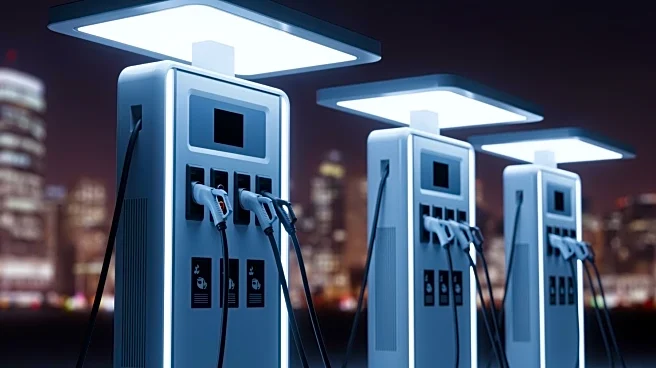What's Happening?
EKA Mobility, an electric vehicle manufacturer based in Pune, India, has secured a strategic investment of ₹500 crore ($57 million) from the India-Japan Fund, managed by the National Investment and Infrastructure Fund (NIIF). This funding is aimed at expanding
EKA's manufacturing capabilities, enhancing research and development, and improving supply chain efficiency. The investment will also support marketing initiatives both domestically and globally. EKA Mobility, founded by Sudhir Mehta, is known for its comprehensive electric commercial vehicle lineup, which includes electric buses, small commercial vehicles, heavy-duty trucks, and three-wheelers. The company is currently manufacturing 200-250 electric buses monthly at its Pune facility and plans to double this production by FY26. EKA is also constructing a third manufacturing plant in Madhya Pradesh to significantly increase its annual production capacity.
Why It's Important?
The investment in EKA Mobility is significant as it underscores the growing momentum in the electric vehicle sector, particularly in India. With a strong order book of over 3,300 electric buses, EKA is well-positioned to capitalize on the increasing demand for sustainable transportation solutions. The company's expansion plans and strategic partnerships with global players like Mitsui & Co. and VDL Group highlight its potential to become a major player in the electric commercial vehicle market. This development is also aligned with government initiatives such as the PLI scheme and the PM e-Bus Sewa program, which aim to promote electric mobility and reduce carbon emissions. The investment not only supports EKA's growth but also contributes to the broader goal of transitioning to cleaner energy sources in the transportation sector.
What's Next?
EKA Mobility's immediate focus will be on scaling up its production capabilities and fulfilling its existing orders. The company aims to achieve profitability within the next two years by focusing on controlled expansion and strategic partnerships. As EKA continues to innovate and expand its product range, it is likely to face increased competition from established players like Tata Motors and Ashok Leyland. However, with strong government support and a robust investment strategy, EKA is well-positioned to navigate these challenges and strengthen its market position. The company's ongoing research into advanced technologies, such as hydrogen fuel cells, in collaboration with partners like KPIT Technologies and BPCL, could further enhance its competitive edge.
Beyond the Headlines
EKA Mobility's expansion and investment strategy reflect broader trends in the global automotive industry, where there is a significant push towards electrification and sustainability. The company's focus on using AI-ML algorithms for smart fleet and battery management highlights the increasing role of technology in optimizing vehicle performance and reducing environmental impact. Additionally, EKA's commitment to using recyclable materials aligns with global efforts to promote circular economy practices. As the electric vehicle market continues to evolve, EKA's strategic approach could serve as a model for other companies looking to balance growth with sustainability.

















